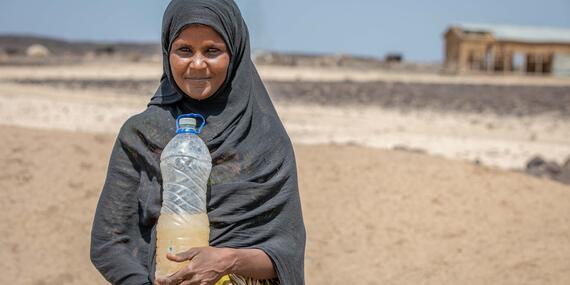Today's top news: Occupied Palestinian Territory, Ethiopia, Cameroon, Sudan, Haiti

Occupied Palestinian Territory
OCHA reports that despite persistent challenges to aid operations in Gaza, humanitarian organizations there continue to do everything possible to get life-saving assistance to civilians, amid mass displacement and a looming famine. OCHA’s Head of Office for the Occupied Palestinian Territory, Andrea De Domenico, told journalists on Tuesday that aid deliveries continue to be regularly impeded due to access denials and delays.
Briefing from Jerusalem, De Domenico said every day is a struggle for survival for the people of Gaza, where no place is safe.
Six months into the war, an estimated 10,000 Palestinian women in Gaza have been killed – among them some 6,000 mothers – according to UN Women’s latest Gender Alert on Gaza. More than one million Palestinian women and girls in Gaza have almost no access to food or safe water, as diseases spread.
The series of gender alerts produced by UN Women on Gaza provides a detailed analysis of the reality of women and girls’ lives in the Gaza Strip, documenting abhorrent living conditions. The publication launched today, “Scarcity and Fear,” focuses on the lack of access to water, sanitation and hygiene services, which are vital to women's health, dignity, safety and privacy.
Ethiopia
The High-Level Pledging Event for Humanitarian Situation in Ethiopia just concluded in Geneva with some 20 donors announcing financial support of US$610 million. The event was organised together with the Governments of Ethiopia and the United Kingdom, and well-attended by donors, the diplomatic community and humanitarian partners.
UN Assistant Secretary-General for Humanitarian Affairs, Joyce Msuya, thanked the donors and said that this is just the beginning and that we hope for continued and increased support throughout the year.
The UN and humanitarian partners are backing the nationally led response to scale up life-saving assistance to 15.5 million people, and food aid to 10.4 million people in Ethiopia. For the entire year, the plan requires US$3.24 billion.
To fund the immediate response and ensure a pipeline of aid for the next five months, US$1 billion is needed. The one-day conference will contribute towards that target.
Cameroon
The UN and its partners today launched, in a joint ceremony with the Government, this year's Humanitarian Response Plan, which seeks US$371 million to assist 2.3 million of the most vulnerable people in the country.
Armed conflict and violence, climate shocks, as well as epidemics, continue to drive humanitarian needs in Cameroon. This year’s plan will prioritize response efforts in the worst-affected areas, including the Far North, the North-West and South-West, and the eastern regions of Cameroon, which have seen an influx of refugees from the Central African Republic.
In 2023, humanitarian partners provided life-saving assistance and protection to some 1.2 million people in Cameroon, including food, nutrition, protection, shelter, health, education and water and sanitation support. This was despite last year’s appeal being less than a third funded.
Going forward, additional resources are urgently required to ensure that the humanitarian community can continue to provide critical humanitarian assistance to the most vulnerable people in Cameroon.
Sudan
France, Germany, and the European Union hosted a conference yesterday in Paris for Sudan and its Neighbors.
We are grateful to them for organizing the event and the many donors who showed their strong support to Sudan. We also welcome the endorsement by the co-hosts of a set of Key Asks on Humanitarian Access, outlining the main priorities and actions needed to facilitate aid operations in Sudan, including expanded and sustained access.
These points were discussed at an informal meeting chaired by the Resident and Humanitarian Coordinator for Sudan, Clementine Nkweta-Salami, on Sunday on the margins of the conference.
Haiti
In Haiti, aid agencies continue to deliver food, water, medicine and other essential support to people displaced by the violence in Haiti’s capital Port-au-Prince in recent weeks.
Yesterday, the World Food Programme distributed hot meals to more than 14,000 internally displaced people in the Port-au-Prince metropolitan zone. WFP also supported some 200,000 school children through its school meal programme.
On Sunday, about 3,500 people received more than 46 metric tons of in-kind food assistance.
Meanwhile, UNICEF and other partners working on water, sanitation and health report that as of yesterday, 5.2 million litres of water have been distributed in Haiti’s capital since 29 February.
